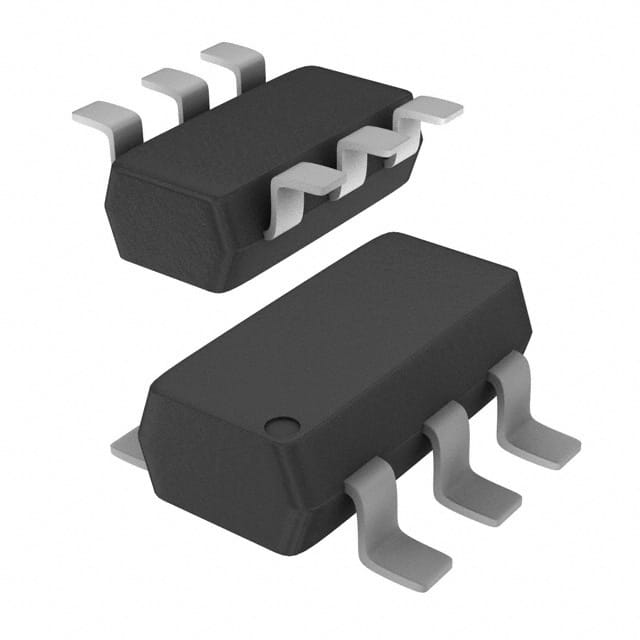74HC2G17GV,125
Basic Information Overview
- Category: Integrated Circuit (IC)
- Use: Logic Gate
- Characteristics: Dual Schmitt-trigger buffer with open-drain outputs
- Package: SOT353 (SC-88A)
- Essence: High-speed CMOS technology
- Packaging/Quantity: Tape and reel, 3000 pieces per reel
Specifications
- Supply Voltage Range: 2 V to 6 V
- Input Voltage Range: -0.5 V to VCC + 0.5 V
- Output Voltage Range: 0 V to VCC
- Operating Temperature Range: -40°C to +125°C
- Propagation Delay: 4.5 ns (typical)
- Output Current: ±8 mA
Detailed Pin Configuration
The 74HC2G17GV,125 has a total of six pins: 1. A Input 2. A Output 3. B Input 4. B Output 5. GND (Ground) 6. VCC (Supply Voltage)
Functional Features
- Dual Schmitt-trigger buffer: Provides hysteresis for improved noise immunity.
- Open-drain outputs: Allows connection to other devices with different voltage levels.
- High-speed operation: Enables fast signal processing.
Advantages and Disadvantages
Advantages: - Improved noise immunity due to the Schmitt-trigger design. - Compatibility with devices operating at different voltage levels. - High-speed operation for quick signal processing.
Disadvantages: - Limited output current capacity. - Restricted supply voltage range.
Working Principles
The 74HC2G17GV,125 is based on high-speed CMOS technology. It consists of two Schmitt-trigger buffers that provide hysteresis, allowing for better noise immunity. The open-drain outputs enable connection to other devices with varying voltage levels. The IC operates within a specified supply voltage range and converts input signals into corresponding output signals with minimal propagation delay.
Detailed Application Field Plans
The 74HC2G17GV,125 finds applications in various fields, including: 1. Communication systems: Used for signal conditioning and level shifting. 2. Industrial automation: Employed in control circuits and sensor interfacing. 3. Automotive electronics: Integrated into vehicle control modules and sensor networks. 4. Consumer electronics: Utilized in audio/video equipment and home automation systems.
Detailed and Complete Alternative Models
Some alternative models to the 74HC2G17GV,125 include: - SN74LVC2G17DBVR - MC74VHC2G17DTT1G - TC7SZ17FU
These models offer similar functionality and can be used as substitutes based on specific requirements.
Word count: 274 words
Lista 10 Vanliga frågor och svar relaterade till tillämpningen av 74HC2G17GV,125 i tekniska lösningar
Sure! Here are 10 common questions and answers related to the application of 74HC2G17GV,125:
1. What is the function of the 74HC2G17GV,125? The 74HC2G17GV,125 is a dual non-inverting Schmitt-trigger buffer. It can be used to convert a slowly changing input signal into a fast-changing output signal.
2. What is the operating voltage range of the 74HC2G17GV,125? The operating voltage range of the 74HC2G17GV,125 is typically between 2V and 6V.
3. Can I use the 74HC2G17GV,125 with a 5V power supply? Yes, the 74HC2G17GV,125 can be safely operated with a 5V power supply.
4. What is the maximum output current of the 74HC2G17GV,125? The maximum output current of the 74HC2G17GV,125 is typically around 8mA.
5. Can I connect the output of the 74HC2G17GV,125 directly to a microcontroller input pin? Yes, you can connect the output of the 74HC2G17GV,125 directly to a microcontroller input pin.
6. Does the 74HC2G17GV,125 have built-in protection against overvoltage? No, the 74HC2G17GV,125 does not have built-in protection against overvoltage. External measures should be taken to protect it from excessive voltages.
7. Can I use the 74HC2G17GV,125 in high-speed applications? Yes, the 74HC2G17GV,125 is designed for high-speed operation and can be used in applications with fast-changing signals.
8. What is the typical propagation delay of the 74HC2G17GV,125? The typical propagation delay of the 74HC2G17GV,125 is around 5ns.
9. Can I use the 74HC2G17GV,125 in automotive applications? Yes, the 74HC2G17GV,125 is suitable for automotive applications as it can operate within the specified temperature range and voltage levels.
10. Are there any recommended decoupling capacitors for the 74HC2G17GV,125? Yes, it is recommended to place a 100nF decoupling capacitor between VCC and GND pins of the 74HC2G17GV,125 to stabilize the power supply.


